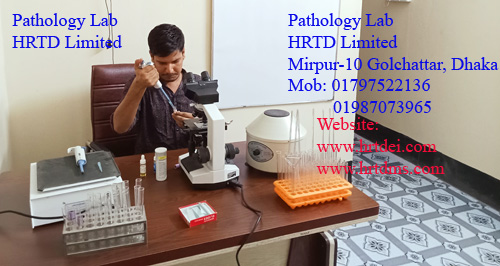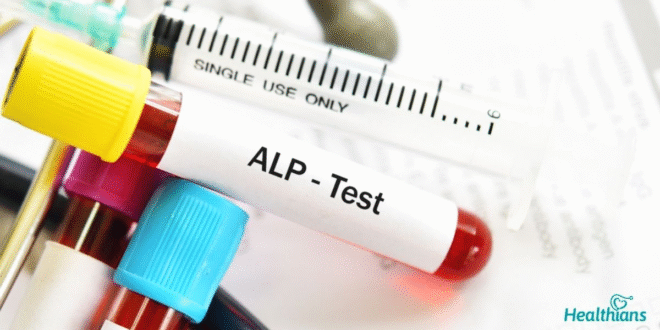Alkaline Phosphatase Test

Introduction of Alkaline Phosphatase Test
In the field of clinical diagnostics, enzyme testing plays a pivotal role in detecting and monitoring various health conditions. One such critical test is the Alkaline Phosphatase Test This test is commonly used to evaluate liver function, bone disorders, and other underlying medical conditions. At HRTD Medical Institute, located in the heart of Mirpur-10, Dhaka, we provide high-quality diagnostic services including the Alkaline Phosphatase Test, ensuring accurate and timely results to support effective treatment planning.
The Alkaline Phosphatase Testis a routine blood test that measures the amount of alkaline phosphatase in the bloodstream. ALP is an enzyme found throughout the body but is most abundant in the liver, bones, kidneys, and digestive system. An abnormal level of ALP can indicate a range of health problems, from liver disease to bone growth abnormalities.
In this comprehensive article, the experts at HRTD Medical Institute explain the significance of the Alkaline Phosphatase (ALP) Test how it is performed, what the results mean, and why it’s important for your health.
What is Alkaline Phosphatase Test?
Alkaline Phosphatase (ALP) is a type of enzyme that helps break down proteins and plays an essential role in various physiological processes. ALP works best in an alkaline environment, which is where it gets its name. There are several types of ALP enzymes, which originate from different parts of the body, including:
- Liver ALP
- Bone ALP
- Placental ALP (during pregnancy)
- Intestinal ALP
In healthy individuals, these enzymes exist in the bloodstream at a normal level. However, any disturbance or disease process in the liver, bones, or other organs can cause these enzyme levels to rise or fall significantly.

Why is the Alkaline Phosphatase Test Performed?
Doctors recommend an ALP test for a variety of medical reasons. Some of the most common indications include:
- Evaluation of Liver Function
High ALP levels are often associated with liver disease, bile duct obstruction, or hepatitis. The ALP test can help detect liver problems before symptoms become severe. - Diagnosis of Bone Disorders
Since ALP is present in bones, especially during growth or repair, elevated levels may be seen in conditions like Paget’s disease, osteomalacia, bone cancer, or healing fractures. - Assessment of Gallbladder and Biliary Diseases
Blockages in the bile ducts, gallstones, or tumors can elevate ALP levels. - Monitoring Treatment Outcomes
For patients undergoing treatment for liver or bone diseases, the ALP test can help monitor how well the treatment is working.
At HRTD Medical Institute, our specialists use ALP testing as a part of comprehensive liver function panels and bone disorder diagnostics, helping patients get precise care at the right time.
Preparation for the Alkaline Phosphatase Test
The Alkaline Phosphatase (ALP) Tests a simple blood test that requires minimal preparation. However, patients should be aware of a few important considerations:
- Fasting: Although not always required, some doctors may ask for fasting if other tests are ordered together.
- Medications: Certain medications, such as birth control pills, anti-epileptics, and antibiotics, can affect ALP levels. Inform your doctor of all medications you are taking.
- Diet: A high-fat meal before the test may slightly affect results, so it’s best to follow any pre-test guidelines given by your physician.
At HRTD Medical Institute, our phlebotomy team ensures that each patient receives clear instructions before sample collection to ensure accurate and reliable test outcomes.
How is the Alkaline Phosphatase Test Performed?
The Alkaline Phosphatase Test involves a standard venipuncture procedure:
- Sample Collection: A blood sample is drawn from a vein, typically in the arm.
- Lab Processing: The sample is analyzed in a clinical laboratory using automated chemistry analyzers.
- Result Reporting: Results are usually available within a few hours to a day, depending on the testing protocol.
Our modern laboratory facilities at HRTD Medical Institute are equipped with the latest automated analyzers to ensure fast, error-free testing. All results are verified by experienced pathologists before being shared with the patients.
Understanding Alkaline Phosphatase Test Results
Once the test is completed, interpreting the results is crucial for identifying potential health concerns. The results are typically measured in units per liter (U/L).
Normal ALP Range
The normal range for ALP levels can vary slightly depending on the laboratory and testing methods used. However, typical reference values are:
- Adults: 44 to 147 U/L
- Children and Adolescents: Higher levels due to bone growth
- Pregnant Women: Slightly elevated due to placental ALP
- Elderly Individuals: May also show higher levels due to bone turnover
It is important to interpret ALP levels in conjunction with other tests and clinical signs. At HRTD Medical Institute, our diagnostic experts do not rely on a single result but consider the full clinical picture to provide an accurate diagnosis.
Causes of High ALP Levels
Elevated ALP levels can be caused by a variety of physiological and pathological conditions:
1. Liver-Related Causes:
- Hepatitis (Acute or Chronic)
- Cirrhosis
- Liver Cancer
- Bile Duct Obstruction (e.g., Gallstones)
- Primary Biliary Cholangitis
- Fatty Liver Disease (NAFLD/NASH)
2. Bone-Related Causes:
- Paget’s Disease
- Osteomalacia
- Bone Metastasis
- Fracture Healing
- Rickets (in children)
3. Other Conditions:
- Pregnancy (due to placental ALP)
- Hyperparathyroidism
- Infections like mononucleosis
High ALP levels are not always a cause for concern—especially in growing children or during the third trimester of pregnancy. However, they must be carefully evaluated when symptoms of liver or bone diseases are present. At HRTD Medical Institute, we offer follow-up testing and physician consultations to clarify any abnormal findings.
Causes of Low ALP Levels
While less common, a decreased ALP level may also be clinically significant. Causes include:
- Hypothyroidism
- Malnutrition or Protein Deficiency
- Zinc or Magnesium Deficiency
- Wilson’s Disease
- Certain Genetic Conditions (e.g., Hypophosphatasia)
Patients with low ALP may require further investigation, particularly if they present with fatigue, bone pain, or growth delays. Our medical team at HRTD Medical Institute ensures such findings are not overlooked and are followed up with relevant tests and consultations.
ALP Isoenzymes: A Deeper Look
To determine the exact source of ALP elevation, a special test known as ALP Isoenzyme Analysis may be performed. This test separates the different forms of ALP:
- Liver Isoenzyme
- Bone Isoenzyme
- Placental Isoenzyme
- Intestinal Isoenzyme
This differentiation is especially helpful when both liver and bone issues are possible. For example, if a patient has elevated ALP and also has joint pain, it becomes critical to determine whether the elevation is liver-related or bone-related. At HRTD Medical Institute, we provide ALP isoenzyme testing for more precise diagnostic information.
ALP in Different Populations
Children and Adolescents:
Children often have higher ALP levels due to active bone growth. Pediatricians at HRTD Medical Institute always take age and growth status into account when evaluating ALP levels.
Pregnant Women:
In pregnancy, especially during the third trimester, placental ALP increases naturally. Elevated ALP is not necessarily a sign of disease unless accompanied by abnormal liver function tests or symptoms like jaundice.
Elderly Individuals:
In older adults, bone diseases such as osteoporosis or bone metastasis may result in elevated ALP. We provide geriatric screening packages that include ALP testing as part of routine health assessments.
Associated Tests with ALP
An isolated ALP result doesn’t tell the whole story. To obtain a complete picture, ALP is often interpreted alongside the following tests:
- Liver Function Tests (LFTs): Includes ALT, AST, GGT, bilirubin, and albumin.
- Calcium and Phosphate Levels: To assess bone metabolism.
- Vitamin D and PTH (Parathyroid Hormone): Especially when bone disorders are suspected.
- Imaging (Ultrasound, X-ray, DEXA scan): To visualize liver and bone health.
At HRTD Medical Institute, we offer comprehensive health packages where ALP is part of a broader diagnostic approach.
Symptoms That May Indicate the Need for an Alkaline Phosphatase (ALP) Test
Alkaline Phosphatase (ALP) Test is not only routine but also indicated by specific signs and symptoms. These may include:
- Unexplained Fatigue
- Yellowing of the Skin (Jaundice)
- Abdominal Pain (especially upper right side)
- Bone Pain or Tenderness
- Frequent Fractures
- Delayed Growth in Children
- Unusual Weight Loss
If any of these symptoms are present, our clinicians at HRTD Medical Institute may recommend an Alkaline Phosphatase Test as part of your diagnostic workup.
Frequently Asked Questions (FAQs)
Q1: Is fasting required before an Alkaline Phosphatase Test?
A: Not necessarily, unless your doctor orders additional tests that require fasting.
Q2: Can medications affect ALP levels?
A: Yes. Certain drugs like antiepileptics, steroids, and oral contraceptives can alter ALP results.
Q3: How quickly can I get Alkaline Phosphatase Test results at HRTD Medical Institute?
A: We provide same-day results in most cases, and urgent cases are prioritized.
Q4: Is Alkaline Phosphatase Test Testpainful?
A: The test involves a simple blood draw and is not painful, though you may feel a slight prick.
Q5: Can ALP levels return to normal after treatment?
A: Yes. With proper treatment and follow-up, abnormal ALP levels can normalize.
Why Choose HRTD Medical Institute for Your Alkaline Phosphatase Test?
At HRTD Medical Institute, we pride ourselves on delivering accurate, affordable, and timely diagnostic services. Here’s why thousands of patients trust us for ALP and other pathology tests:
- ✅ Experienced Laboratory Professionals
- ✅ Modern Diagnostic Equipment
- ✅ Fast and Reliable Reporting
- ✅ Affordable Health Checkup Packages
- ✅ Patient-Centered Services
- ✅ Consultations with Specialist Doctors
Our facility, located at Section-6, Block-Kha, Road-1, Plot-11, Metro Rail Pillar-249, Folpotti Mosque Lane, Mirpur-10, Dhaka-1216, is easily accessible and open six days a week for your convenience.
📞 Contact Numbers:
01797522136 | 01987073965 | 01784572173
Conclusion
The Alkaline Phosphatase Test is a valuable diagnostic tool that offers insights into liver and bone health. Whether you’re dealing with liver discomfort, bone-related symptoms, or simply undergoing a routine checkup, this test can guide timely and appropriate medical care.
At HRTD Medical Institute, we go beyond just testing—we provide patient education, comprehensive care, and follow-up support to ensure your health journey is guided with expertise and compassion.
 Pathology Training Institute in Bangladesh Best Pathology Training Institute in Bangladesh
Pathology Training Institute in Bangladesh Best Pathology Training Institute in Bangladesh


